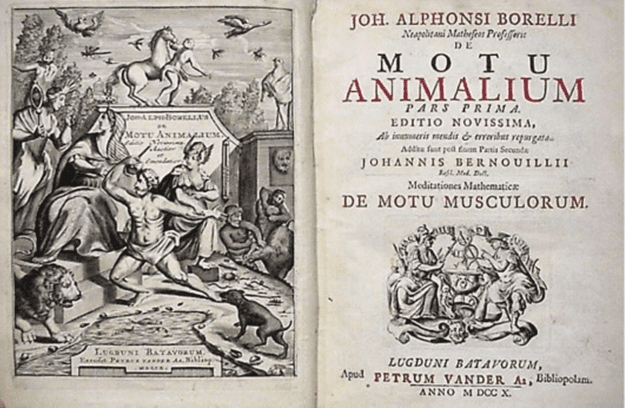Giovanni Borelli lived during one of the darkest periods of Italy, when much of its territory was ruled by foreign powers and the Inquisition controlled the minds and bodies of its people. Born in Naples in 1608, he was mentored in his youth by the distinguished philosopher Tommaso Campanella, a prisoner in a castle in that city. He began studying mathematics at age sixteen and later expanded his work to astronomy and physiology. He may have had some medical training, at least in anatomy and dissection.
Borelli’s father was Miguel Alonso, a Spanish infantryman stationed in Naples. Condemned to the galleys for perhaps conspiring to free Campanella, he was freed and exiled to Rome, where young Borelli was exposed to the publicity and details of the trial of Galileo Galilei. Borelli’s mother was a local Neapolitan woman called Laura Porrello whose name he later assumed. She may have had an affair with Campanella, who thus would have been his natural father.
Borelli’s fist appointment was in 1635 in Messina as public lecturer in mathematics. He was later promoted to professor. He studied the movement of the planets, the flight of birds, and when plague struck Messina was charged by the city senate to determine its cause. For this he visited other cities, observed autopsies, noted the circumstances under which the disease developed, and concluded that the plague was not due to meteorological or astrological influences but to something, perhaps chemical, entering the body from the outside. He accordingly prescribed a chemical remedy, sulfur.
In 1642 the Messina senate sent him on a mission to leading universities to recruit good teachers, especially in law and medicine. He visited Tuscany, spent time in Florence, then in Bologna, Padua, and Venice. By 1643 he was already becoming known in Italy, having carried out studies in mathematics, physiology, and planetary astronomy.
In 1654 Borelli attempted to secure a professorial position in Pisa but was passed over. When he did receive this appointment in 1658 he moved to that city. He immediately began collaborating with scientists in Rome; established an anatomical laboratory in his own house; and applied his skills in mathematics and anatomy to study the movement of muscles. He was in this respect compared to Leonardo and produced a series of drawings similar to his.
Borelli studied the force of muscles, determined the center of the mass of the body, measured volumes of inhaled and exhaled air, and described the course of the blood flow. He became a member of the Cimento Academy in Florence and collaborated with scientists in describing physical phenomena and perfecting measuring techniques. He published an important work on the theory of the motions of the moons of Jupiter; and established an observatory near Florence to study comets. All that time he was also carrying out dissections, and he collaborated with Marcello Malpighi and Lorenzo Bellini in investigating the structure of the kidney, publishing in 1664 in a short piece titled De renum usu judicum.
He was not a popular lecturer. Long-winded and dreary, he often was drowned by jeers and laughter, even forced to stop before he finished his lecture. In 1667 he returned to Messina to the chair of mathematics. On the way he passed through Rome, stopped for the summer in Naples, and again studied and experimented.
In Messina he resumed his various studies, wrote a paper about the deviation towards the east of a body dropped from a tower, and in 1669 observed a major eruption of Mount Etna. He made notes on the topography of the mountain, the location of the lava flow, the nature of the materials ejected, and offered some reasoned speculations on the sources of the heat powering the eruption.
He also took an interest in public affairs and politics. Agitation had been growing between the local citizens and their Spanish overlords, leading in 1674 to a revolt that was assisted by the French. When the French withdrew, Borelli was declared a rebel, a price was placed on his head, and he quickly left for Rome. There he published and edited more works and continued to correspond with other scientists. He also came to the attention of Queen Christina of Sweden, who had converted to Catholicism and moved to Rome to establish there an academy of science. For a while Borelli was patronized by the Queen but as he did not receive adequate financial support his financial situation began to deteriorate, especially after he was robbed of all his possessions by a servant. He ended up living in poverty and died in 1679.



